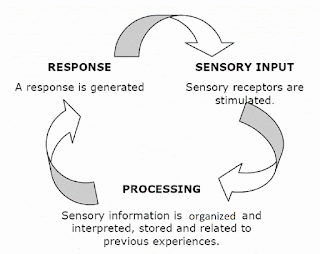Raising Kids on the Spectrum: Sensory Processing Difficulties, Behavioral Problems, and Parental Stress

A child's ability - or inability - to regulate sensation (i.e., the process of noticing, organizing, and integrating information from the environment and the body, and then processing and responding appropriately) significantly contributes to general behavior patterns. Problems with regulating sensory information (e.g., taste, sound, touch, smell, body movement, or body position) may lead to patterns of: hypo-sensitivity or sensory-seeking behaviors (e.g., needing high levels of sensory input such as a loud noise, firm touch, repeatedly crashing into walls, banging toys in order to register the sensation, etc.) hyper-sensitivity or sensory-avoidance (e.g., over-reacting to bright lights, loud noises, being held, etc.) a mixed pattern of sensory-seeking and sensory-avoidance ASD level 1 (or High-Functioning Autistic) kids with poor sensory regulation show a wide range of problems across several domains, including internalizing behavior problems, externalizing behav
